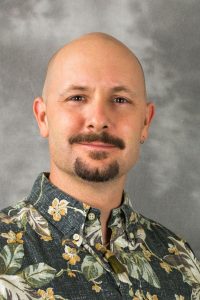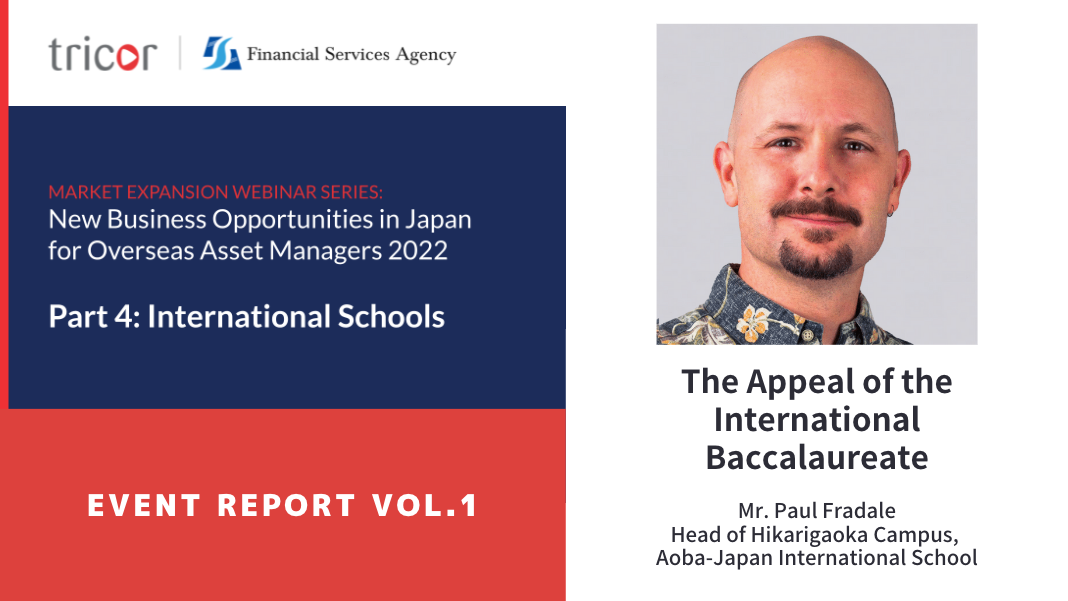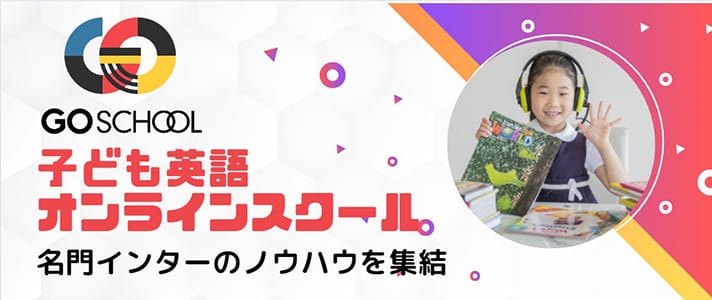The Appeal of the International Baccalaureate
Sponsored by FSA and Tricor! The Latest on International schools & Boarding schools
Event report on a popular international educational event
On Thursday, November 10 and Thursday, November 17, an “International schools and Boarding schools Online Seminar” (sponsored by FSA and Tricor) was held. Over two days approximately 500 participants, mainly foreign investors who are considering establishing a presence in Japan, and domestic and foreign families interested in international education, were informed about the international school and boarding school opportunities for their children in Japan.
The editorial team will provide a three-part report on the seminar with presentation from the speakers.
In this first article, we bring you a presentation by Mr. Paul Fradale, Head of Aoba Japan International School Hikarigaoka Campus, on “The Appeal of the International Baccalaureate.”
 Mr. Paul Fradale
Mr. Paul Fradale
Aoba Japan International School Hikarigaoka Campus, Head
Mr. Fradale has been an educator for 31 years and has worked in both state and private schools in Hawai’i and Japan. He is currently the Head of Hikarigaoka Campus for Aoba-Japan International School, an IB World School with over 700 students. A former lecturer for International Christian University, he has published several peer-reviewed journal articles, a book with Routledge released in 2021, and is completing his doctoral thesis, all on Blended Learning. Paul is an expatriate American; he has lived in Japan for 21 years and is now a permanent resident. In his spare time he is renovating a 132 year old farmhouse in rural Japan with his wife, also an expatriate American, and their story has been covered by CNN.
Developing attitudes and skills for responsible behaviour
What is the International Baccalaureate Curriculum?
It is a set of K-12 educational programs offered by the International Baccalaureate Organization.
The International Baccalaureate (“IB”) was established in 1968 as a comprehensive educational programme to prepare students to understand and cope with the complexities of the world and to develop attitudes and skills for responsible behaviour in the future.
 In the decades since the IB arrived in Japan, it has mainly focused on the DP (Diploma Programme), but gradually branched out into the PYP (Primary Years Programme) and MYP (Middle Years Programme). Most recently, the CP (Career Programme) has been developed as an IB offering.
In the decades since the IB arrived in Japan, it has mainly focused on the DP (Diploma Programme), but gradually branched out into the PYP (Primary Years Programme) and MYP (Middle Years Programme). Most recently, the CP (Career Programme) has been developed as an IB offering.
The IB was originally established to meet educational needs from expatriate residents. As the world became more closely connected, and as more families looked beyond their own shores for opportunities for their children, it became evident that the local educational systems did not necessarily benefit the full range of learners, regardless of their background. From the beginning, IB was designed to serve the needs of expatriate businesspeople, ambassadors, and other global leaders. Eventually, as the community began to recognize the great value in what the IB had to offer, the mission of the IB shifted to serving a broader population.
It is a holistic approach to education. It is characterised by a balance between subject areas and an inquiry-based approach with a focus on student agency that allows children to take the initiative in their learning.
To be an IB school, a school must have certain qualifications and periodic reaccreditation to ensure consistency so that students have a similar experience as they move from country to country and school to school. The IB is known for its excellence in ensuring a certain standard of education wherever it is found.
Graduates of IB schools have higher acceptance rates to the world’s top universities than the average high school graduates worldwide; when IB graduates enter their first year of college, it is typical for them to say, “My final year of high school was harder than my first year of college/university.”
Leading universities around the world accept the IB as an admission requirement. And in many cases, if students reach a certain achievement level, they can even earn college/university credit for courses taken.
Multilingual and multifaceted learning and exploration is the attraction!
There are four programmes available:
| Programme | Ages | Detail |
|---|---|---|
| PYP (Primary Years Programme) | 3-12 | ● Emphasises mental and physical development ● Transdisciplinary skills development ● Can be offered in any language |
| MYP (Middle Years Programme) | 11-16 | ● Students connect learning and society through conceptual learning ● Transdisciplinary approach ● Can be offered in any language |
| DP (Diploma Programme) | 16-19 | ● Prescribed two year curriculum with rigorous external examinations ● Internationally recognized university entrance qualification ● Generally offered in English, French or Spanish |
| IBCP (Career-related Programme) | 16-19 | ● Career and vocational education ● Emphasises skills acquisition for lifelong career development ● Courses offered in English, French or Spanish |
PYP (Primary Years Programme)
The PYP is a programme for children aged 3-12. It promotes mental, physical, and emotional development. It is interdisciplinary, meaning that all subjects are seamlessly combined into units of inquiry. The first year of the program ends with something called an exhibition. This is a one-year program; the first half is a preparation period. Then, in the second half, the children synthesise what they have researched and create a large event for their parents and the community to share what they have learnt.
This allows children to connect what they are learning and gain conceptual understanding that supersedes facts and figures. This allows for some flexibility in approach. In other words, it is concept-driven rather than content-driven, so it can be offered in any language, and is not limited to any single curriculum, allowing both national as well as international curricula.
MYP (Middle Years Programme)
The MYP is a program for 11-16 year olds. It connects society through conceptual learning. Common topics and subjects include maths, science, English, as well as the Arts and physical education. The MYP can also be offered in any language.
This program delves deeply into conceptual thinking, and includes transdisciplinary approaches to the different subject areas. The program ends with either a community or personal project, depending on whether the MYP ends in Year 3 or Year 5. These projects are usually done by the children on their own time. The personal projects, as the name implies, are done by the students themselves and are designed to prepare them for the college-level writing they will study in the DP.
It also prepares them to further their own learning by pursuing an area of passion or interest. And at the end of the MYP, students can take an optional external exam.
DP (Diploma Programme)
The DP is a program for 16-19 year olds. It is very similar to a first-year college course, with many specialised courses within a single subject group area.
For example, if you are interested in science, you can take all three subjects in the science classification: physics, biology, and chemistry. Furthermore, these subjects are divided into two levels: SL (Standard Level) and HL (High Level). The difference between these levels is characterised by the sophistication of conceptual exploration and the breadth of topics.
The DP is completed by a set of mandatory external exams that children take. How many you take depends on whether you are pursuing the full diploma or just a selection of specific classes.
For the full diploma, students must also complete a CAS (Community Action Service) section or segment. Then there is what is called an Extended Essay usually completed the summer before their final year in high school. In the Extended Essay, children pursue topics that interest them. It may be a project, a research paper, or an original performance piece, but it always includes a writing component. There is a third course of study called “Theory of Knowledge” that explores ontology and epistemology through different subject group area lenses. These three components are in addition to the study of other subjects.
The score from the three requirements above is then added to the scores obtained from tests and internal assessments to arrive at the final score. These scores are used to help children apply to colleges and universities for scholarships and, in the case of particularly bright students, to earn credit for or advance to advanced college courses.
Currently, DP is offered in English, French, or Spanish. However, over time, the number of languages in which the DP is offered has increased. The Japanese Ministry of Education, Culture, Sports, Science and Technology is keen to spread the IB throughout Japan, and has set a goal of 200 schools within five years, which has now been achieved or is close to being achieved.
IBCP (Career-related Programme)
Finally, there is the IBCP. This is the most recent program to be created and is a career-related program. It is career and vocational related education. It is designed to address the needs of students who are looking for a more direct career path after high school, without necessarily wanting to enter college directly. The courses are offered in English, French, and Spanish.
Students can learn independently and develop the ability to think deeply through many subjects
Advantages of choosing IB Curriculum

IB subject choices are studied across six subject areas, one from each of the six groups: native language, second language, social studies, science, mathematics, and the arts. A variety of subjects are also available in these groups, allowing students to study areas that may not typically be studied in high school.
②Students can develop the ability to learn independently and think deeply.
The IB aims to nurture internationally-minded individuals, and has set forth 10 learner profiles as its educational goal, including “inquirers” and “thinkers”. This is reflected in the educational content, which includes practical learning through group work in class for active learning, and many essays and presentations as assignments, requiring students to summarise and formulate their own opinions based on their research.
In primary PYP, there are generally fewer homeroom teachers, and most subjects are taught by the homeroom teacher, while other languages, art, and physical education are often taught by specialists.
At the elementary level, we understand that developmentally, children are still working on executive functioning to take ownership of their learning. Therefore, we provide strong support and scaffolding by faculty and staff to help children take more responsibility for their own learning in a gradual and liberating way.
In the MYP, there are typically a greater range of teachers than in the PYP, and children move from room to room, studying subjects with different students and different teachers. This is a mobile classroom-based learning program often seen in Europe and the United States, taught by specialised teachers.
It is expected that by the time students reach middle school, they will be quite capable of self-discipline. However, some students are new to the IB program, so there is a transition period for these students to develop the basic skills they need.
The DP comprises specialised subjects and learning by subject expert teachers. As in all higher education, students are expected to be in control of themselves and completely independent. Teachers guide and assist, but students are expected to plan and execute their own learning.
-The appeal of IB
The appeal of the IB curriculum is that it is based on a strong foundation of inquiry. It has earned a reputation for nurturing children with a holistic approach that addresses both their emotional and cognitive development.
From a parent’s perspective, students are able to develop not only academically, but also emotionally and socially. I have taught in both IB-accredited and non-IB schools, and I have consistently found IB schools around the world to be genuinely happy learning environments, and that is what attracts me to them.
Writer: Kaori Takahashi




